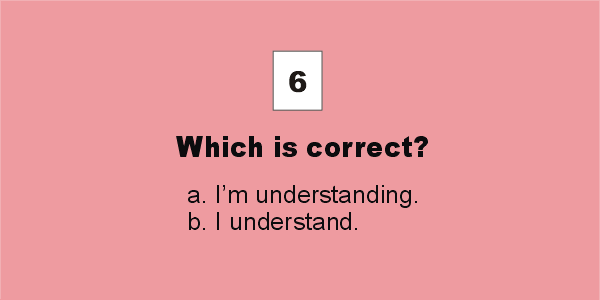Grammar: Present Tenses
A: Simple Present shows (action or situation exists now). The syntax is: (Subject + Verb (s-es) + Object). For example:
- I dance.
- He dances.
- They dance.
B: Present Progressive shows (action is in progress now in the present going one). The syntax is: (Subject + Be + Verb + Ing + Object). For example:
- I am dancing.
- He is dancing.
- We are dancing.
NeoTip:
Understand is not used in the progressive tenses.
You say: I understand what you’re saying.
Don’t say:
In the above example: B is correct. I understand and A is incorrect.
C: Present Perfect shows (action begins in the past and leads up to and includes the present). The syntax is: (Subject + Has/Have + VerbIII + Object). For example:
- I have danced.
- She has danced.
- You have danced.
D: Present Perfect Progressive (action begins in the past, continues in the present, and may continue into the future). The syntax is: (Subject + Has/Have + Been + V + Ing + Object): For example:
- I have been dancing.
- He has been dancing.
- They have been dancing.
E: Functions of Present Tenses
1. She lives in London. (Fact)
2. Water boils at 100°. (Fact)
3. You take the third turning on the left. (Instructions)
4. She smokes a lot. (Habit)
5. She has dinner at 7.00. (Routine)
6. I hear she's getting married. (Continuous action in some future time)
7. The train leaves at 6.00. (Schedule)
8. I swear to tell the truth. (Momentary actions)
9. Pakistan wins the match. (Momentary action)
10. I'm seeing John at 6.00. (Future planned action)
11. The phone's ringing. (Present continuous action)
12. He's always swearing. (Habitual continuous action)
13. He has completed his course. (Completion of an action)
14. I have been to London. (Completion of an action in the negative)
15. We have been cooperating with the manager. (Perfect and progressive at the same time)
Excercise
1. Identify the tenses.
Umer has always thought of perfection. He cannot stand anything less than perfection. He is a teacher and he wants to see his work accomplished perfectly. He is working on a project called ‘Autonomy’ which means that students should be autonomous in learning. He has been working on this project for three years.
Umer has always thought of perfection. He cannot stand anything less than perfection. He is a teacher and he wants to see his work accomplished perfectly. He is working on a project called ‘Autonomy’ which means that students should be autonomous in learning. He has been working on this project for three years.
1. Read and write the proper forms.
It (be) winter and it (snow). It usually (snow) in January here. Betty and James (play) in the garden. They (build) a snowman and they (throw) snowballs. They (like) the snow very much. Their father and mother (not/like) it. They always (stay) in the house when it is cold. Their mother usually (watch) TV and their father (listen) to the radio or (read) a book. At the moment, they (sit) in the living room. Mother (write) a letter and father (read) a book. They often (look) out the window to watch their children.
3. Correct the following sentences.
1. She (play) foot ball every day. -------------------
2. Ali (like) music. -----------------------------------
3. I (live) in Lahore at the moment.----------------
4. We already (learn) the lesson. -------------------
5. It (rain) for/since two days.----------------------
6. The child(sleep) now.-----------------------------
7. You (come) home late every day.----------------
8. They (make) noises for/since June.-------------
9. I (not do) my work yet.----------------------------
10. His father (get) up early.--------------------------
11. You already (start) the job?----------------------
12. I (not meet) him since then.----------------------
13. He (still wait) for me there?----------------------
14. He (smoke) nowadays?---------------------------
15. The son (wake) all night?-------------------------
Subscribe to:
Post Comments
(
Atom
)

1. Identify the tenses.
ReplyDeleteUmer has always thought (PRESENT PERFECT TENSE) of perfection. He cannot stand anything less than perfection. He is a teacher and he wants (PRESENT SIMPLE TENSE) to see his work accomplished perfectly. He is working (PRESENT CONTINUOUS) on a project called ‘Autonomy’ which means that students should be autonomous in learning. He has been working (PRESENT PERFECT PROGRESSIVE) on this project for three years.
1. Read and write the proper forms.
It (is) winter and it (is snowing now). It usually (snows) in January here. Betty and James (are playing) in the garden. They (are building) a snowman and they (are throwing) snowballs. They (like) the snow very much. Their father and mother (do not like) it. They always (stay) in the house when it is cold. Their mother usually (watches) TV and their father (listens) to the radio or (reads) a book. At the moment, they (are sitting) in the living room. Mother (is writing) a letter and father (is reading) a book. They often (look) out the window to watch their children.
3. Correct the following sentences.
1. She (plays) foot ball every day.
2. Ali (likes) music.
3. I (am living) in Lahore at the moment.
4. We (have) already (learnt) the lesson.
5. It (has been raining) for two days.
6. The child(is sleeping) now.
7. You (come) home late every day.
8. They (have been making) noises for/since June.
9. I (have not done) my work yet.
10. His father (gets) up early.
11. (Have)you already (started) the job?
12. I (have not met) him since then.
13. (Is) he (still waiting) for me there?
14. (Does) he (smoke) nowadays?
15. (Has) the son (been waking) all night?